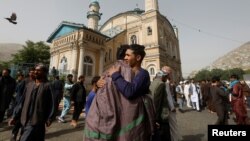Warring sides in Afghanistan have temporarily ceased battlefield hostilities for the first time in nearly 18 years after a Taliban limited cease-fire went into effect on Friday.
The Afghan government already has halted its counter-insurgency operations for a week starting from last Tuesday to encourage the Islamist Taliban to come to the table to seek a negotiated end to an increasingly deadly war in the country.
The insurgent group has pledged not to attack Afghan security forces during three-day Muslim festival of Eid al-Fitr, which started Friday to mark the end of the fasting month of Ramadan.
Pro-Taliban social media sites showed pictures of insurgents sharing Eid greetings with Afghan soldiers in several provinces.
In a televised speech to the nation shortly after offering the special Eid prayers, Afghan President Ashraf Ghani announced that both sides "mutually” began observing the cease-fire after midnight.
“I congratulate the people of Afghanistan on this first ever cease-fire in our recent history,” Ghani said. The crowd around him applauded.
The president went on to praise the Taliban for halting insurgent activities, saying his government would welcome all moves that would end bloodshed and enable Afghans to peacefully celebrate their Eid as well as other national days.
“We hope that this cease-fire truce will continue and there is no bloodshed anymore in the Muslim Afghan nation,” Ghani said and reiterated his resolve to do all for his part to promote a peaceful settlement to the conflict with the Taliban.
The U.S. military has promised to adhere to the government’s cease-fire but it has vowed to continue with its counterterrorism operations against Islamic State and other terrorist groups in the country.
War-weary Afghans, including women, in recent days have taken to streets to welcome the cease-fire and have demanded the Taliban and the government work together to extend duration of the truce to open peace talks.
But analysts such as Washington-based Michael Kugelman, are skeptical about whether the cease-fire could lead to an Afghan peace dialogue.
“Taliban violence has soared since the Afghan government's unilateral truce went into effect on Tuesday. This is an indication that the Taliban will act on its own terms, and it doesn't inspire much confidence about future reconciliation prospects,” tweeted Kugelman.
The insurgents have killed more than 60 Afghan security forces across the country since the government's cease-fire took effect earlier this week.
In his message of Eid felicitation earlier this week, Taliban chief Hibatullah Akhundzada, reiterated that direct talks with the United States and withdrawal of foreign troops from Afghanistan were the way out of the conflict.
"If the American officials truly believe in a peaceful end to the Afghan imbroglio, then they must directly present themselves to the negotiation table so that this tragedy [invasion] the destructive effects of which mainly harm the American and Afghan people can be resolved through talks," Akhundzada said.
"The biggest mistake on part of the American officials is that they approach every problem with stubbornness, but force cannot yield results in every case," added the Taliban chief.
Speaking on Friday, Ghani also praised a group of Afghan activists marching towards Kabul after setting off their journey 600-kilometers away in the southern Helmand province a month ago in their bid to press warring sides to talk peace.
The Afghan president said the marchers are nearing Kabul with their message of peace and urged residents of the capital city to warmly welcome them.




